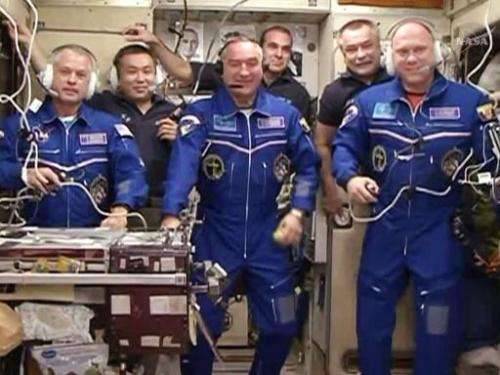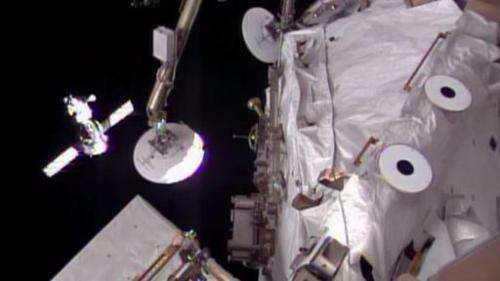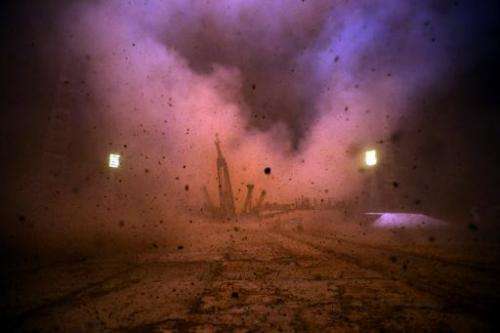Russian spacecraft docks at ISS after two-day delay (Update)

A Moscow-backed spacecraft carrying two Russians and a US astronaut on Friday docked successfully at the International Space Station after a technical hitch caused an unprecedented two-day delay.
The Soyuz TMA-12M, carrying Russia's Alexander Skvortsov and Oleg Artemyev and NASA's Steve Swanson, docked at 3:53 am Moscow time (1153 GMT Thursday), Russia's mission control said.
Hours after the successful docking, Russian state media reported that the head of Moscow's mission control, Viktor Ivanov, had been sacked.
The RIA Novosti news agency cited a mission control source who said the sudden dismissal of Ivanov was not connected to the technical problem that forced the Soyuz's crew to spend an extra two days in orbit before docking with the station.
The report gave no further explanation for the sacking.
'We made it!'
Skvortsov was first to open the hatch into the ISS around 7:00 am Moscow time (0300 GMT), hugging the crew members already on board and grinning broadly.
"That was fun... It's a lot more spacious in here," Skvortsov said in a video link-up from the ISS.
The trio were originally meant to dock early Wednesday, just six hours after launch from Kazakhstan, but their Soyuz spacecraft suffered a technical glitch on its approach.
The spacecraft had to orbit the Earth 34 times before its rendezvous with the international space laboratory, instead of the fast-track route of four orbits originally planned.
"It was a long two days but we made it. Glad to be here," Swanson said on a video link-up from the ISS.

The problem started once their Soyuz capsule was already in orbit and a thruster failed to fire.
US space agency NASA said in a statement that the Soyuz spacecraft "was unable to complete its third thruster burn to fine-tune its approach" to the ISS.
The Soyuz capsule instead was forced to make three manoeuvres in orbit to bring it on the correct trajectory.
The head of the Russian state firm Energia, which made the Soyuz rocket that propels the craft into space, said Wednesday that the origin of the problem was not yet clear.
Vitaly Lopota told the Interfax news agency the problem could have been due to a mathematical error in determining at what altitude the thruster should fire.
A commission has been formed to pinpoint the cause of the problem.
'Can't scare us off'
The flight director for the Russian section of the ISS, Vladimir Solovyov, vowed Friday to stay on the fast-track route it began using last year.
"We will continue to work according to this scheme. You can't scare us off with just this one thing," he said, as quoted by the ITAR-TASS news agency.

Soyuz's onboard computers may be updated as a precaution after mission control did not receive the necessary orientation from the capsule, he said.
"This was the rarest combination of circumstances," Solovyov added.
"Maybe for such an unlikely case, we will put something extra into the memory of the onboard computer—just in case."
NASA is wholly reliant on Russia for delivering astronauts to the space station since the US retired its space shuttles.
The trio bring the ISS crew up to six. Incumbent crew Koichi Wakata of Japan, American Rick Mastracchio and Russian Mikhail Tyurin are due to leave in May.
Officials have vowed cooperation between the US and Russia on the space program will continue unaffected by mounting diplomatic tensions over the Crimea crisis.
Skvortsov, 47, is making his second space flight and 53-year-old Swanson, a veteran of two past shuttle missions, his third.
Artemyev meanwhile is on his first voyage to space. The 43-year-old took part in a 2009 experiment where volunteers were shut up in a capsule at a Moscow laboratory for 105 days to simulate the effects of a possible voyage to Mars.
© 2014 AFP



















